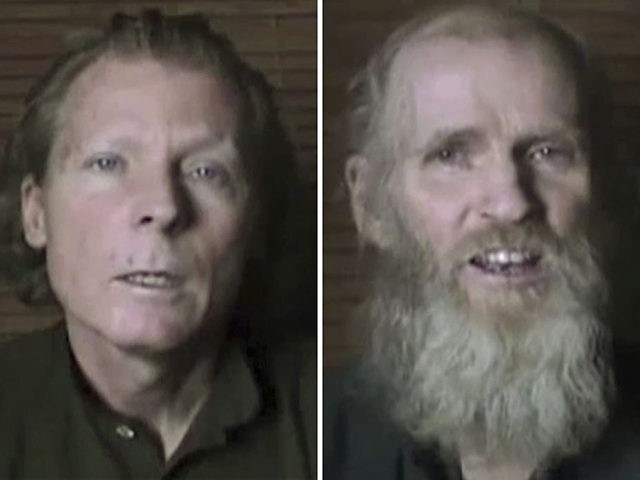The Taliban released two Western professors, an American and an Australian, on Tuesday after more than three years in captivity. In exchange, the Afghan government released three Taliban jihadists and flew them to Qatar.
The professors — American Kevin King, 60, and Australian Timothy Weeks, 48 — taught at the private American University of Afghanistan in Kabul. They were abducted at gunpoint in August 2016 after jihadists stopped their vehicle near the university.
After holding the hostages for more than a year, the Taliban made it known that King suffered from “a dangerous heart disease and kidney problem” and his health was “worsening rapidly.” The two prisoners were forced to appear in a video that displayed them in poor condition and ask for a prisoner exchange to obtain their freedom.
Western officials long suspected the notorious Haqqani Network, a criminal gang affiliated with the Taliban, abducted the two men.
One of the high-ranking militants the Afghan government released on Tuesday in exchange for King and Weeks was Anas Haqqani, the younger brother of Haqqani Network leader Sirajuddin Haqqani. Their father, Jalaluddin Haqqani, was a U.S. ally during the Soviet invasion of Afghanistan in the 1980s. Some Western intelligence analysts believe King and Weeks were abducted, along with several other victims, in a fit of rage after the Afghan government sentenced Anas Haqqani to death.
Afghanistan sent the three former Taliban detainees to the Taliban’s political office in Doha, the capital of Qatar, where they are supposed to remain under “house arrest.” One of the high-ranking officials at the Taliban office in Qatar is the brother of one of the released detainees.
A unit from the U.S. Joint Special Operations command picked the kidnapped professors up in eastern Afghanistan. The area where they were covered is under Taliban control but the government recently agreed to an unofficial ceasefire there.
The American University of Afghanistan, the families of the two kidnapped men, and the U.S. government supported the exchange. The Weeks family did not make a public statement but asked Australian Prime Minister Scott Morrison to “convey their relief that their long ordeal is over, and their gratitude to all those who have contributed to Tim’s safe return.”
“We are so happy to hear that my brother has been freed and is on his way home to us. This has been a long and painful ordeal for our entire family, and his safe return has been our highest priority. We appreciate the support we have received and ask for privacy as we await Kevin’s safe return,” King’s sister Stephanie Miller said in a statement.
Secretary of State Mike Pompeo reviewed plans for the exchange with Afghan President Ashraf Ghani on Monday and “committed to work closely together to address violence if the President’s decision does not produce the intended results,” according to the State Department.
“Secretary Pompeo reaffirmed the continuation of U.S. support to Afghan security forces and hailed their performance. Ongoing security support and a political settlement are both necessary for Afghans to achieve peace and prevent international terrorists from ever again using Afghanistan as a platform for international terrorism,” the State Department said.
The White House also welcomed the release of King and Weeks. “We pray for the full recovery of both men, who endured significant hardship during their captivity, and wish them well as they reunite with their loved ones in the near future,” said the White House statement released on Tuesday.
“President Trump has no higher priority than the safety and security of American citizens. The Trump Administration continues to work tirelessly to secure the freedom of Americans, and citizens of our allies, held in captivity,” the White House added.
The prisoner exchange was originally scheduled to occur last week, but was postponed for reasons which have not been made public. The government of Pakistan was also involved in arranging the deal.
Ghani described it as a “hard decision” but said the deal was necessary to facilitate further negotiations with the Taliban. He also said the health of both professors had deteriorated dangerously during their years in captivity. Pakistani Prime Minister Imran Khan expressed hope that it would provide “a boost of confidence to all parties involved to re-engage in the peace process.”
The most optimistic view the prisoner exchange holds that it was a major step forward because the Taliban has previously refused to deal with the government in Kabul at all, arguing that it is merely a puppet of the United States. The White House statement on Tuesday made a point of saluting Afghan President Ghani for his “many courageous steps in the cause of peace,” including offers to negotiate with the Taliban and a 2018 ceasefire for the Muslim holiday of Eid-al-Fitr that was reciprocated by the Taliban.

COMMENTS
Please let us know if you're having issues with commenting.